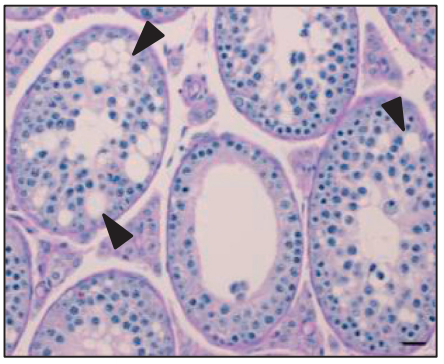Basigin null mutant male mice are sterile and exhibit impaired interactions between germ cells and Sertoli cells
Basigin (BSG) is a multifunctional glycoprotein that plays an important role in male reproduction since male knockout (KO) mice are sterile. The Bsg KO testis lacks elongated spermatids and mature spermatozoa, a phenotype similar to that of alpha-mannosidase IIx (MX) KO mice. MX regulates formation of N-acetylglucosamine (GlcNAc) terminated N-glycans that participate in germ cell–Sertoli cell adhesion. Results showed that Bsg KO spermatocytes displayed normal homologous chromosome synapsis and progression through meiosis. However, only punctate expression of the round spermatid marker SP-10 in the acrosomal granule of germ cells of Bsg KO mice was detected indicating that spermatogenesis in Bsg KO mice was arrested at the early round spermatid stages. We observed a large increase in the number of germ cells undergoing apoptosis in Bsg KO testes. Using lectin blotting, we determined that GlcNAc terminated N-glycans are linked to BSG. GlcNAc terminated N-glycans were significantly reduced in Bsg KO testes. These observations indicate that BSG may act as a germ cell-Sertoli cell attachment molecule. Loss of BSG significantly reduced adhesion between GC-2 and SF7 cells. Moreover, wild type testes showed strong expression of N-cadherin (CDH2) while expression was greatly reduced in the testes of Bsg KO mice. In addition, the integrity of the blood-testis barrier (BTB) was compromised in Bsg KO testes. In conclusion, although some Bsg KO spermatogonia can undergo normal progression to the spermatocyte stage, BSG-mediated germ cell-Sertoli cell interactions appear to be necessary for integrity of the BTB and spermatocyte progression to mature spermatozoa.

